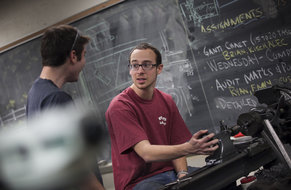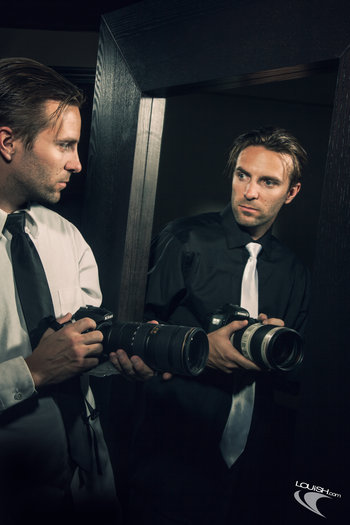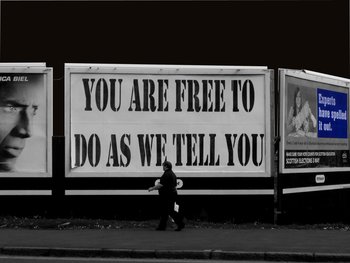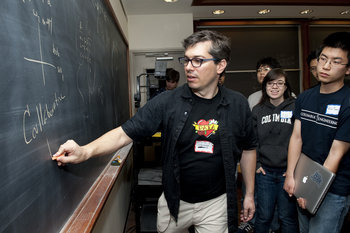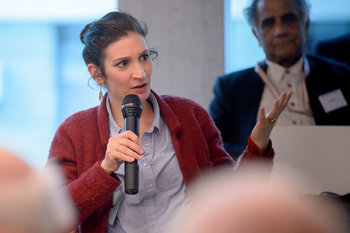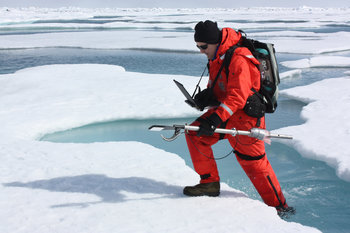
Catch-22
Catch-22 is a contradictory system, rule or process that is absurd. These may be used as a system of oppression or may simply exist due to the irrational nature of a society, organization or group. A common example of catch-22 is that you need experience to get a job but need a job to get experience. The term was coined by Joseph Heller in his 1961 novel Catch-22. The book gives numerous examples of a catch-22 such as a regulation that states you can get out of combat if you are crazy but the act of applying to get out of combat proves that you are sane.Self-Reference
Self-reference is an easy way to make a paradoxical statement that is neither true nor false. These are sometimes used as a means of provoking thought.This statement is false.
Abilene Paradox
The abilene paradox is the observation that groups sometimes make decisions that are viewed as illogical by all members of the group. This has to do with a process of social compromise whereby nobody gets what they want. The abilene paradox can result in decisions that independent third parties also view as illogical.Birthday Problem
The birthday problem is a mathematical result that many people find non-intuitive.In a room with 23 people, what is the probability that two people have the same birthday?
Many people calculate this incorrectly with results around 6%. The actual answer is 50.7297%. This is due to the fact that each person compares their birthday to each other person resulting in a total of 253 potential matches.Potato Paradox
The potato paradox is another mathematical calculation that produces a non-intuitive result.You have 100 pounds of potatoes that are 99 percent water by weight. You let them dehydrate until they're 98 percent water. How much do they weigh now?
People often expect the weight to drop to about 99 pounds but the actual answer is 50 pounds. When the water decreases from 99% to 98%, the amount of non-water material increases from 1% to 2%. This is a doubling of the non-water material. In order for this to occur, half the weight of the water must evaporate.Ship of Theseus
A thought experiment that asks if a ship that has all its parts replaced one-by-one over the years is still the same ship. If it is not the same ship, at what point did it cease being the same ship? If you assemble another ship with all the parts removed from the original ship, is that the same ship? This has dozens of potential solutions that often provoke much thought and debate. For example, the idea that identity only lasts for an instant such that we are never the same from moment to moment.Cute Aggression
The commonly reported urge to squeeze, poke, pinch or otherwise superficially hurt things we find exceedingly cute. People who experience this don't understand where it comes from and find it counterintuitive and paradoxical.Big Lie
Big lie is a theory of propaganda that suggests it is easier to convince people of a big lie than a small lie. This is based on the idea that people will not believe that anyone would have the audacity to tell such a large lie. Whether the theory of big lie is true or not is open to debate. A large lie is generally easier to detect as they typically require much supporting evidence.False Positive Paradox
The false positive paradox is a tendency for people to dramatically misjudge the effect of false positives. For example:A store has 100 shoplifting incidents a month. They use an artificial intelligence to monitor 1,000,000 shoppers each month to detect which are shoplifters. The AI has a false positive rate of 1%. Suzy is flagged by the system as a shoplifter. What is the probability she is innocent?
Most people who answer this question focus on the fact that the AI is only wrong 1% of the time and believe there is only a 1% chance Suzy is innocent. This neglects the fact that the AI scans 1,000,000 people resulting in 10,000 false positives with only 100 shoplifting incidents. This means that 9,900 of the accused are innocent and only 100 guilty. As such, there is approximately a 99% chance Suzy is innocent. Lottery Paradox
The lottery paradox is a disbelief that something rare can happen to an individual that exists alongside an acceptance that the same thing does happen to someone. For example, people will find it hard to believe that a particular ticket is the winner of a lottery with 500 million tickets issued. However, they also accept that a winning ticket does exist. This can be shown to be a paradoxical view.Zeno's Paradox
A series of paradoxes that are all based on infinite divisibility. For example:An architect is designing a building. They complete half the remaining work each day. When will the work be completed?
The answer is that the work will never be completed because half of something is always something. As such, you will simply complete smaller and smaller portions of work each day to infinity. Decision Making Paradox
The decision about the best way to make a decision is also a decision. So if you don't already know the best way, there is no way you could choose the best way.Irresistible Force Paradox
What happens when an unstoppable force meets an immovable object?Buridan's Ass
Buridan's ass is a thought experiment that puts a donkey who is equally hungry and thirsty an equal distance from food and water. In the thought experiment, the animal doesn't know what to do and doesn't move at all. The implication is supposed to be that there is no rational way to make a choice between equal options. However, it is rational to randomize a choice in this situation. As such, the ability to choose something random is a requirement for rational thought.Grandfather Paradox
A well known paradox that involves traveling in time to meet your own grandfather. This may change the course of your grandfather's life causing you not to be born. It is common to use paradoxes to test theories and ideas. The grandfather paradox is one of the reasons that it is generally believed that time travel is not possible.Oxymoron
An oxymoron is language that is contradictory such as "awfully good" or "alone together." This is technically paradoxical but isn't typically meant to be taken literally.| Overview: Paradox | ||
Type | ||
Definition | A seemingly contradictory statement, situation or calculation that is either true, potentially true or undefined such that it is neither true nor false. | |
Related Concepts | ||









